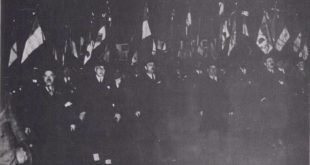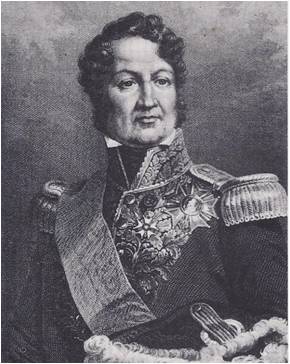The year is 1789; the place, Versailles, France. Several hundred delegates representing the people of France sit sullenly in the palace hall. When an officer of the King orders them to leave the hall and return to their proper meeting place, one delegate rises to his full height and thunders, “Tell your master that we are here by the will of the people, and that only bayonets can drive us forth” A meeting of representatives of the French people? Defiance to the commands of the powerful king of France? In view of what you have read earlier about royal authority …
Read More »Tag Archives: Paris
The Revival of Town Life and the Growth of Learning
Pierre watched the merchant caravan clatter down the narrow dirt road that led through the manor. Pack mules threaded their way to avoid the deep puddles, while the horses strained as they pulled the creaking two wheeled carts. Pierre envied the merchants as well as the sturdy bowmen who guarded the caravan. During his seventeen years Pierre had never been more than a few miles from the manor where he had been born a serf. He was not free to move around as were these merchants who were city folk. Was it true, as Pierre had heard, that a serf …
Read More »Democratic but Divided 1926-1939
UNLIKE Britain, France was not a highly industrialized country; its economy was fairly evenly divided between industry and farming. For this reason, the depression came to France later than it did to any of the democracies and its effect was less severe, but in no other democracy did communists and fascists play so large a part. For a time there was real danger that the French republic would be overthrown by the fascists and there were riots in the streets. One reason the fascists were so dangerous was that the French people were sharply divided in their political opinions. There …
Read More »The Victors Reconstruct Europe 1918 – 1919
IN THE closing weeks of the war, the Austro-Hungarian Empire came apart. Its subject peoples proclaimed their independence, through “national councils” set up in Paris and London. On November 12, 1918, the last of the Hapsburg emperors, Charles I, abdicated and the next day Austria became a republic. Hungary became a republic a week later. Yugoslavia and Czechoslovakia also came into existence and Rumania helped itself to the slice of Hapsburg territory called Transylvania. Before any peace conference could meet, the empire’s former subjects had redrawn the map to suit themselves and the Allies formally recognized the new nations. THE …
Read More »Problems of a Changing World 1870-1914
WHILE INDUSTRY was transforming the United States, the same thing was happening in Western Europe. The change was most noticeable in Germany, because Germany was not unified until 1870, it started to become industrial much later than Great Britain and France, but it soon began to catch up with its neighbours. Within a few decades it was producing more than they were of several key commodities, including the most important one of all, steel. Like the American government, the German government imposed tariffs on foreign manufactures and encouraged its national industry in other ways. The results were much the same …
Read More »Another Napoleon 1848-1906
IN DECEMBER of 1848, the French elected Louis-Napoleon Bonaparte as president of the Second French Republic. What he stood for was not very clear, but to most Frenchmen that did not seem important. He was the nephew of the great Napoleon and the very sound of his name stirred them like a battle-cry. Since the defeat of the first Napoleon in 1815, there had been little in French politics to capture the imagination. As the years passed, the French looked back on the Napoleonic era as the time of their greatest glory. The writer Victor Hugo wrote poems about Napoleon. …
Read More »The Revolution of 1848; 1830-1848
LOUIS PHILIPPE always spoke of himself humbly as the “citizen king.” Although he was dignified, friendly and tried to do things that would make him popular, his government could not satisfy the needs of the people. The reason was that only one out of every thirty Frenchmen had the right to vote. The Chamber of Deputies represented only the nobles and the rich upper crust of the middle class and often it did not even debate questions that were of importance to the great majority of the people. Many Frenchmen did not like the new king. The republicans were opposed …
Read More »Democracy in France 1815-1830
AFTER THE fall of Napoleon, Louis XVIII came to the throne of France. Although his powers were limited, by following a middle-of-the-road policy he was able to rule peacefully until his death in 1824. His brother, Charles X, then became king and soon began using his influence to undo as much of the French Revolution as possible. He was able to have laws passed which required the government to pay large sums of money every year to the nobles whose land had been taken from them during the revolution. The Catholic Church was strengthened and once again priests began teaching …
Read More »Emperor of the French 1804 -1815
On December 2, 1804, in a ceremony of great pomp and splendour at the cathedral of Notre Dame in Paris, Napoleon Bonaparte was crowned Napoleon I, Emperor of the French. Pope Pius VII was there. He had come from Rome to offer his blessing and to place the crown on the head of the new emperor but Napoleon did not do what was expected of him. Instead of kneeling, he took the crown from the Pope’s hands and put it on himself. He also placed a crown on the head of his wife, Josephine. Only twelve years had passed since …
Read More »The Rise of Napoleon Bonaparte 1796-1802
In March of 1796, a new commander named Napoleon Bonaparte was placed in charge of the French army on the Italian front. The soldiers and officers were amazed when they first saw him. He was short, thin, pale, only twenty-seven years old and spoke French with an Italian accent. Napoleon was not an unknown. He had first come to public attention as the young artillery officer who drove the British fleet from the harbour at Toulon. Later, as a brigadier general, he had successfully defended the Convention from an uprising in Paris. What most people did not know was that …
Read More »








